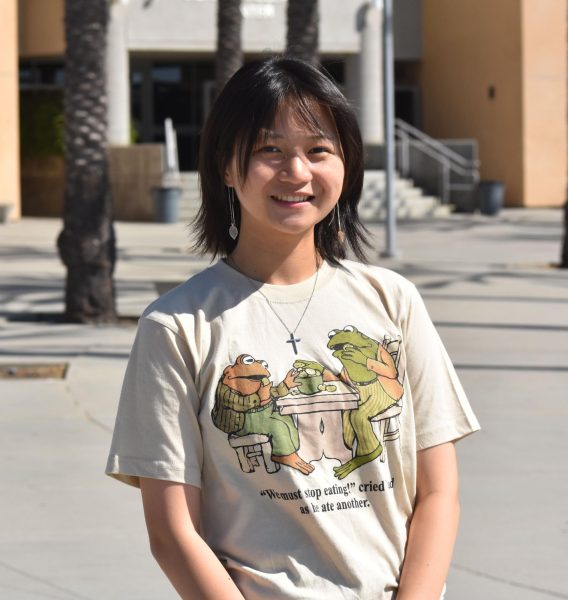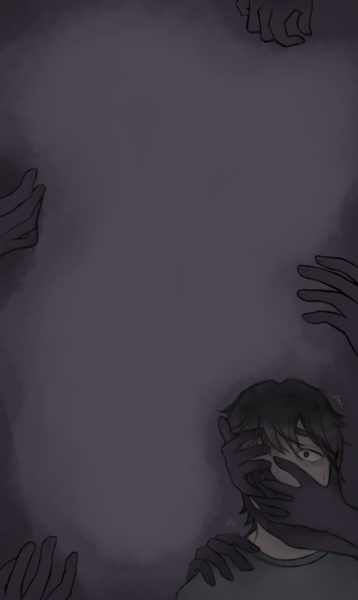Lost in Translation
Through bridging cultural and generational differences with their immigrant parents, students strengthen family connections.

As a child, Dylan Cassara (10) often found herself becoming upset at her mom, Leanh Cassara, a Vietnamese immigrant whose command of the English language was sometimes shaky. As a six year old, she recalled asking questions like “Why do you talk like that?” or “Why don’t you know how to say things properly?”
Even though Dylan loved her mom, she just couldn’t wrap her head around why her mom couldn’t speak perfect English like she could.
Dylan, surrounded by people who spoke either Spanish or English, had grown up learning Spanish. Listening to her mom speak in Vietnamese and make grammatical errors when speaking English confused Dylan.
“For a while, she also didn’t tell me that English was her second language,” Dylan said. “So when my mom would ‘mess up,’ I thought she’d be doing it on purpose or someone maybe didn’t teach her correctly.”
Similarly, Sophia Wang (10) often failed to understand her mom. Wang’s mom, Hui Zheng spoke little to no English, and since Wang’s Chinese vocabulary only went up to elementary-level Chinese, they struggled to communicate, resulting in conversations that frustrated the two of them.
“I’ve always had to speak Chinese at home [with my mom], but my Chinese isn’t very good since I’ve lived in America my whole life,” Wang said. “It’s just a bit of a struggle trying to talk to her sometimes. I’ll try to talk to her and I’ll have Google Translate pulled up on my phone, which is kinda crazy. [For example,] probably start of ninth grade, I didn’t know how how to say ‘orchestra’ in Chinese so then I had to look it up and say ‘yuèduì.’”
Even so, Wang didn’t want to let the language barrier between her and Zheng hinder their relationship. Thus, she started asking her mom for clarification on phrases in Chinese, hoping to pick up more of the language.
“As I’ve gotten older, I’ve been trying to ask her ‘What does this mean?’” Wang said. “Or, I never knew what [my parents] names meant in Chinese, so I’ll be like ‘What does your name mean? My vocabulary is limited, and sometimes she’ll say a phrase I don’t know, so I’ll ask her to explain it for a minute or two and it helps our relationship because we can have a peaceful conversation while she’s explaining what it means. I feel like being able to speak in pure Chinese would do wonders for my relationship with my mom.”
Wang said these conversations not only are increasing her knowledge of Chinese but are also benefiting her relationship with her mom.
For Dylan, learning about her mom’s past helped her bridge the gap between the two of them.
Whenever Dylan would ask her mom about certain things Dylan couldn’t quite comprehend, like the way Leanh talked or the food she ate, her mom would share bits and pieces of her story.
When she was 5 years old, she was forced to flee Vietnam during the Vietnam War. Along with her family, Leanh boarded her grandpa’s boat and traveled across the ocean to America, eventually finding refuge in California. Since Leanh was the second oldest of her family, she shouldered much of the responsibility for caring for her younger siblings and teaching them English.
“At the time, it was still hard for me to process it because I was nine, but I’d try to be helpful to her,” Dylan said. “I’d be like ‘I hope the guy who did that dies or explodes’ or something like that, but I imagine that it was also hard for her to talk about it because she struggled a lot with being open about her feelings, and I feel like admitting all the bad things that happened to you in the past to your own kid is really hard.”
Sharing her story with Dylan helped the two of them grow closer.
“There were more things to talk about because I actually understood more things about her [and her culture],” Dylan said. “I feel like when I got to know parts of her better, it made it easier for me to go and talk to her because it felt more comforting.”
Soh-Leong Lim, a retired marriage and family therapy professor at San Diego State University, has researched immigrant family dynamics and their generational differences. She said that although it may be difficult for a parent to share their trauma and past, doing so can strengthen the relationship between a parent and child.
“Refugees are forced to migrate, and they [can] go through so much trauma, and many stories are not told because the person who suffered the trauma finds it hard to talk about,” Lim said. “If [their stories are shared], the parent and child can talk more easily without fear of opening a can of worms. It’s so hard to tiptoe yourself around [it].”
In October 2022, going into Dylan’s freshman year of high school, Leanh got diagnosed with gastrointestinal cancer. When Dylan discovered this, she found herself in a state of denial.
“I didn’t know what to do when she [was sick] because I had already been going through a lot of mental health struggles, and knowing that my mom was sick on top of that, it was too hard for me to face the reality of what was really happening,” Dylan said. “I remember thinking ‘Oh she’s getting better’ instead of ‘she’s there [at the hospital] more and more because she needs more medication and things are getting bad.’”
Leanh passed away in the summer of 2021.
“When it did happen, I remember feeling really numb because it was really hard for me to process,” Dylan said. “All the moments where I thought my mom would be with me, she’s not physically, at least.”
While grieving and processing the passing of her mom, Dylan decided that she would get better in touch with her Vietnamese culture, something that she knew her mom would’ve enjoyed. Initially, Dylan, who was more accustomed to her dad’s Italian culture, was wary of the Vietnamese food that her mom would make. She was scared to try the food from her mom’s culture.
“I used to be scared to try the food that she would make or the food from her culture because, even though I was exposed to it, she never forced me to try it,” Dylan said.
For the first time ever, Dylan tried pho, a traditional Vietnamese noodle soup, in 2023.
“It was really good,” Dylan said. “I remember my dad was like ‘your mom would be crying right now.’ I’ve been trying to expose myself to Vietnamese culture more because I don’t want that culture to be a part of me that I lose just because my mom is no longer here.”
Dylan plans on continuing to learn the Vietnamese language as she becomes more in touch with her mother’s culture.
Ramsay Liem is a psychology professor at Boston College who researches intergenerational trauma and Asian American identity formation. While he was doing oral histories with Korean Americans about their experiences during the Korean War, some of his Korean American students interviewed people in their families who were survivors of the war.
“In most cases–but not all–the conversations were [surprisingly] well received,” Liem said. “Parents and grandparents [were] unsure at first why their children wanted to know [about their past, but] ultimately came to appreciate the chance to open up a conversation with their children that they never thought they would have.”
Phoenix Vo (12) didn’t know how to spark up conversations with her mom about her declining mental health due to both internal and external pressure.
Although she could see and feel how her immigrant mom cared for her and wanted to provide her with a life in America that she herself couldn’t have growing up, Vo felt a lot of pressure to achieve academic success.
She had always been a straight-A student until around the end of middle school. When her grades began slipping, Vo said she often had conflicts with her mom.
“My mental health wasn’t really the best during that time because I didn’t really know how to communicate with her about how I was feeling,” Vo said. “I don’t think she really knew how to communicate with me about how she was feeling, so there was kind of a disconnect with us.”
Vo’s mom Dana Chieng said that in the past, she and her daughter struggled to see the other’s point of view.
“Coming from Vietnam, we were raised to obey our parents and to follow their guidance without any question and that we basically don’t really have a voice of our own,” Chieng said. “We always strived to become whoever our parents wanted us to be. So, it was very difficult for me to understand my daughter, Phoenix, especially in an environment where [children] want to make their own [choices] instead of listening to their parents.”
While in America, one may search for their identity by “staying true to themselves,” Liem said that Asian families tend to identify themselves with a more collectivist perspective in order to “strengthen the standing of the family in the eyes of others.”
“Each member of the family has unique responsibilities and entitlements—[for example,] parents to protect, educate, guide and children, to abide by parental guidance, bring honor and value to the family name through their achievements, etc.,” Liem said. “With this in mind and the traditional (but also changing) valuing of education in Asian cultures, educational success is one means by which children bring respect, honor, and in some cases, material well-being not simply to themselves, but to the family and its members.”
The clashing mindsets of Chieng and Vo led to them having numerous arguments on the subject.
Eventually, after the stress of school, her own insecurities, and feelings of increased pressure from her parents piled up on her, Vo decided to ask her parents about a life-changing proposition.
She wanted to go to a boarding school.
She had been looking at a few options, one of them being Developing Virtue Girls School in Ukiah, California. After discussions and debates, her parents allowed her to go.
“I was away from home for most of the year, except for breaks, and I think because of that, I grew more mature and grew more independent,” Vo said. “ I had never really been independent in my life before because my mom—I love her [and] she’s great—but she’s also very overprotective sometimes. It was a very weird experience to suddenly be on my own and to have to deal with all of my problems and all of my academic stuff on my own. I had to learn how to do more things on my own instead of my mom always being there and relying on her and falling back on her.”
Simultaneously, Chieng was working on getting her PhD in psychology, a subject she hoped to study primarily in order to better understand her daughter’s generation.
“[The] main issue [was our] different cultures and different points of view,” Chieng said. “Our generational difference really made it difficult for me back then to really understand what Phoenix was going through and that just led to a lot of back-and-forth arguments that at the time, I felt would never end.”
Eventually, as the two grew independently, they started building a better relationship with each other.
“I thought I gave Phoenix unconditional love, so that’s why I was really confused why she was acting the way she was,” Chieng said. “As I approach the last year of my degree, I have cultivated knowledge and skill sets which are useful and I was able to better understand my daughter; we now have better communication and now. This stressful and high-demand society and surroundings really put overwhelming pressure on Phoenix that I can now see.”
Lim said there are two dimensions that are most important to parenting, both of which fall under providing a secure base for their children.
“You must have a balance [in] the category of love, that [shows] support and warmth, and then control, [meaning] discipline and boundaries,” Lim said. “[Asians tend to be] very high in control but low on expressing warmth whereas Western parenting is very high in expressing warmth. The best kind of parenting is [is] high in discipline and warmth, [also known as] authoritative parenting.”
Over the summer, Vo volunteered at a summer camp and discovered her passion for working with younger students. If she had told her mom about her aspirations in education a few years ago, Vo said Chieng wouldn’t have been as accepting partly due to her mother’s concerns about the potential financial instability in education. But now, she’s supportive– both for Vo’s career choices and otherwise.
“Being a parent, we are always protective of our daughters, and as first-generation, I believe we always live our lives in fear that something is going to happen to them,” Chieng said. “That was my old version, but as I grow and become a better mother, I have realized my daughter needs to make her own mistakes and learn from them by herself. I cannot always seek to prevent them.”
Ultimately, Chieng became a support system for Vo to fall back on. This change of perspective came as a huge relief to her.
“It felt like if all went wrong, or if suddenly I wanted to switch [occupations], or something just didn’t go right, I knew I would have someone or my family to fall back on because I knew they were supportive,” Vo said. “Before, I used to be afraid that I wouldn’t amount to what they wanted me to be, but now, since she’s really supportive about whatever I want to do, it feels really nice. No matter what happens, no matter what profession I go into, it won’t matter, because she’ll still be there for me.”






